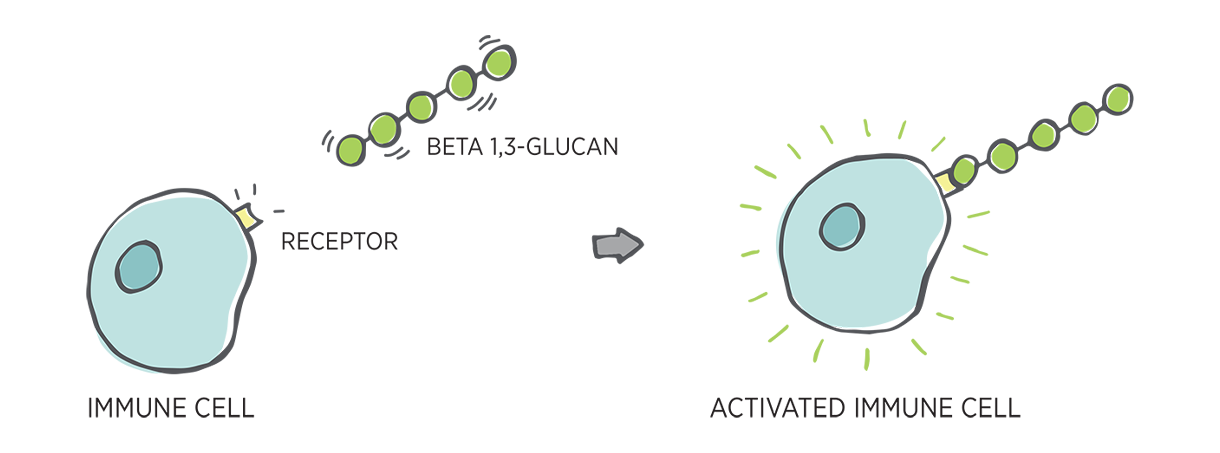Beta glucan is going from an obscure compound that no one has ever heard of to being recommended by mainstream health experts — and for good reason! There are over 20,000 peer-reviewed articles discussing beta glucan in medical and scientific journals. Many of them focus on its powerful immune-supporting actions, but they also study beta glucan’s benefits for gut health, stress and mood health, liver health, and much more.
What is Beta Glucan?

Beta glucans are polysaccharides, or long chains of glucose molecules, present in algae, bacteria, yeast, fungi, and plants like oats and barley. Most beta glucans, including the types found in fungi, oats, and barley, serve as structural components in the cell wall — much like the beams in a house. The beta glucan in an algae called Euglena gracilis, however, is different. It serves as the algae’s energy storage and is found floating freely within the cell.
Fun facts about Euglena gracilis algae:
Euglena gracilis are a freshwater species of single-celled algae. They are heterophiles, which means they can live with or without sunlight, and they store energy in unique structures called paramylons. These paramylons, which are shaped like tiny hockey pucks, are made up of tightly wound linear beta 1,3-glucan molecules. There are so many of them that they can form between 20-80% of the cell’s weight.
The 1,3 in Beta 1,3-Glucan
Although there are multiple forms of beta glucan, only one configuration has the powerful immune-supportive effects validated by research — beta 1,3-glucan. Why is the 1,3 form so much more effective? It has to do with how the beta glucan molecules are linked to each other. For optimal immune benefits, there must be linkages between the first and third carbons of each beta glucan molecule, with no other side branch linkages.
Why do these linkages matter? Beta 1,3-glucan linked in this way creates a linear chain versus a branched chain. This linear chain is easier for your body to absorb, which in turn makes it better for supporting your immune system. Euglena gracilis has an abundance of these 1,3 linkages, far more than yeast, mushrooms, or any other food.

How Does Beta 1,3 Glucan Work?
Our immune cells naturally have receptors that allow them to recognize and interact with beta glucans. Once assimilated, beta 1,3-glucans helps train & optimize our immune cells by keeping them equipped and ready. It does this in two key ways.

Fortifying our First-Line Defense
When we ingest beta 1,3-glucan, it passes into the intestines and then gets transported into the lymphatic system where it can interact with our immune cells. Phagocytes are the Pac-Man-like immune cells that detect, engulf, and destroy unfamiliar substances. But beta 1,3-glucans are like Pac-Man’s vitamins, enriching and enhancing the phagocytes that serve as our innate immune response and first line of health defense.
Augmenting our Adaptive Defense
Once the immune cells on the front line are engaged, they release signaling molecules that notify other immune cells to arrive and bring reinforcements — a process called “recruitment.” Beta 1,3-glucan promotes optimal immune cell communication and the right rate of recruitment, helping to keep our second line of defense in check.

Supports Digestive Tract Health
Research shows that beta glucan supports healthy gut bacteria in various ways. For example, it acts as a postbiotic. This means that the deactivated algae, plus their own nutrients and metabolites, can be used by our gut bacteria for energy and healthy function. This is a win-win since gut bacteria help optimize digestion, and they also produce short chain fatty acids which help promote healthy immune function. Another way beta glucan supports digestive tract health is by upholding gut barrier integrity and function.
Benefits of Beta 1,3 Glucan
Some of the health benefits of beta 1,3-glucan substantiated by scientific research are:
- Supports a healthy immune system and optimal immune function
- Helps equip key immune cells (such as macrophages, dendritic cells, and neutrophils)
- Provides antioxidant support against oxidative stress
- Supports respiratory tract health
- Supports digestive tract health
- Promotes gut barrier integrity and function
- Promotes the growth of beneficial bacteria (such as Lactobacillus and Bifidobacteria)
SuperPure® Beta 1,3 Glucan
Beta 1,3-glucan is most commonly extracted from yeast, often with harsh chemicals, and is usually not nearly concentrated enough. SuperPure Beta 1,3-Glucan, on the other hand, is a natural beta 1,3-glucan derived exclusively from Euglena gracilis algae. This water-extracted form is incredibly pure, highly concentrated to 500 mg beta 1,3 glucan per capsule, easily bioavailable to your immune cells, and more economical to boot.
What Makes SuperPure® Beta 1,3-Glucan Stand Out?
- A yeast & allergen-free option derived exclusively from nutrient-rich algae
- 500 mg Beta 1,3-Glucan from 700 mg Euglena gracilis algae per capsule
- No harsh chemical solvents, excipients, or preservatives
- GMO-free, Gluten-free, Vegan, Kosher
- Manufactured in the USA using eco-friendly processes
Key Takeaways
Beta 1,3-glucan is a natural compound found only in algae, and it’s most highly concentrated and bioavailable in an algae called Euglena gracilis. Beta 1,3-glucan can help keep our immune system in tip-top shape, ensuring our immune cells are equipped and ready, and promote optimal digestive health. In this day and age, we could all use healthy immune support!


